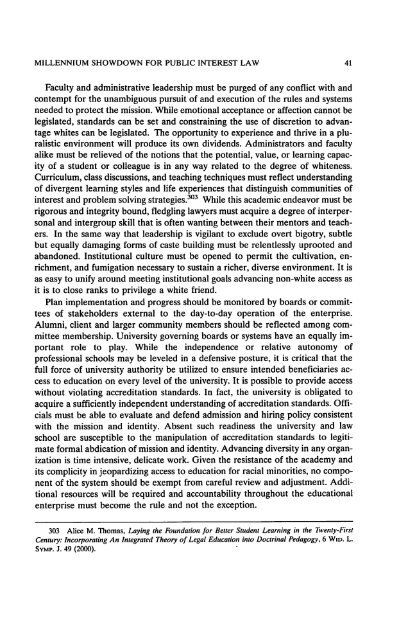Download Electronic Version - UDC Law Review
Download Electronic Version - UDC Law Review
Download Electronic Version - UDC Law Review
You also want an ePaper? Increase the reach of your titles
YUMPU automatically turns print PDFs into web optimized ePapers that Google loves.
MILLENNIUM SHOWDOWN FOR PUBLIC INTEREST LAW 41<br />
Faculty and administrative leadership must be purged of any conflict with and<br />
contempt for the unambiguous pursuit of and execution of the rules and systems<br />
needed to protect the mission. While emotional acceptance or affection cannot be<br />
legislated, standards can be set and constraining the use of discretion to advantage<br />
whites can be legislated. The opportunity to experience and thrive in a pluralistic<br />
environment will produce its own dividends. Administrators and faculty<br />
alike must be relieved of the notions that the potential, value, or learning capacity<br />
of a student or colleague is in any way related to the degree of whiteness.<br />
Curriculum, class discussions, and teaching techniques must reflect understanding<br />
of divergent learning styles and life experiences that distinguish communities of<br />
interest and problem solving strategies. 303 While this academic endeavor must be<br />
rigorous and integrity bound, fledgling lawyers must acquire a degree of interpersonal<br />
and intergroup skill that is often wanting between their mentors and teachers.<br />
In the same way that leadership is vigilant to exclude overt bigotry, subtle<br />
but equally damaging forms of caste building must be relentlessly uprooted and<br />
abandoned. Institutional culture must be opened to permit the cultivation, enrichment,<br />
and fumigation necessary to sustain a richer, diverse environment. It is<br />
as easy to unify around meeting institutional goals advancing non-white access as<br />
it is to close ranks to privilege a white friend.<br />
Plan implementation and progress should be monitored by boards or committees<br />
of stakeholders external to the day-to-day operation of the enterprise.<br />
Alumni, client and larger community members should be reflected among committee<br />
membership. University governing boards or systems have an equally important<br />
role to play. While the independence or relative autonomy of<br />
professional schools may be leveled in a defensive posture, it is critical that the<br />
full force of university authority be utilized to ensure intended beneficiaries access<br />
to education on every level of the university. It is possible to provide access<br />
without violating accreditation standards. In fact, the university is obligated to<br />
acquire a sufficiently independent understanding of accreditation standards. Officials<br />
must be able to evaluate and defend admission and hiring policy consistent<br />
with the mission and identity. Absent such readiness the university and law<br />
school are susceptible to the manipulation of accreditation standards to legitimate<br />
formal abdication of mission and identity. Advancing diversity in any organization<br />
is time intensive, delicate work. Given the resistance of the academy and<br />
its complicity in jeopardizing access to education for racial minorities, no component<br />
of the system should be exempt from careful review and adjustment. Additional<br />
resources will be required and accountability throughout the educational<br />
enterprise must become the rule and not the exception.<br />
303 Alice M. Thomas, Laying the Foundation for Better Student Learning in the Twenty-First<br />
Century: Incorporating An Integrated Theory of Legal Education into Doctrinal Pedagogy, 6 WID. L.<br />
SVMP. J. 49 (2000). .














